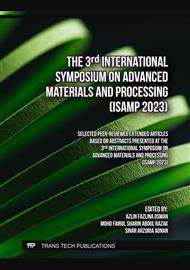[1]
G.A. Ormondroyd, M.J. Spear, C. Skinner, The opportunites and challenges for reuse and recycling of timber and wood products within the construction sector, In Environment Impacts of Traditional and Innovative Forest-based Bioproducts, (2016) 45-103.
DOI: 10.1007/978-981-10-0655-5_3
Google Scholar
[2]
J.S. Dhaliwal, Natural fibers: applications. Generation, development and modifications of natural fibers, 2 (2019) 1-23.
Google Scholar
[3]
S. González-García, F.S. Ferro, D.A.L. Silva, G. Feijoo, F.A.R. Lahr, M.T. Moreira, Cross-country comparison on environmental impacts of particleboard production in Brazil and Spain, Resour. Recovery. Conserv. 150 (2019)104434.
DOI: 10.1016/j.resconrec.2019.104434
Google Scholar
[4]
A.L.F. Freire, C.P. de Araújo Júnior, M. de Freitas Rosa, J.A. de Almeida Neto, M.C.B. de Figueirêdo, Environmental assessment of bioproducts in development stage: The case of fiberboards made from coconut residues, J. Clean. Prod. 153 (2017) 230-241.
DOI: 10.1016/j.jclepro.2017.03.100
Google Scholar
[5]
P. Lertwattanaruk, A. Suntijitto, Properties of natural fiber cement materials containing coconut coir and oil palm fibers for residential building applications, Constr. Build. Mater. 94 (2015) 664-669.
DOI: 10.1016/j.conbuildmat.2015.07.154
Google Scholar
[6]
P.P. Das, F.M. Haque, M.A. Rahman, Experimental study on the fabrication and mechanical properties of medium-density particleboards from coconut coir. In AIP Conference Proceedings (Vol. 2324, No. 1) (2021).
DOI: 10.1063/5.0037564
Google Scholar
[7]
J.E.G. Van Dam, M.J.A. Van Den Oever, E.R.P. Keijsers, Production process for high density high performance binderless boards from whole coconut husk, Ind. Crops. Prod. 20(1) (2004) 97–101.
DOI: 10.1016/j.indcrop.2003.12.017
Google Scholar
[8]
S. Halvarsson, H. Edlund, M. Norgren, Properties of medium-density fibreboard (MDF) based on wheat straw and melamine modified urea formaldehyde (UMF) resin, Ind. Crops. Prod. 28(1) (2008) 37-46.
DOI: 10.1016/j.indcrop.2008.01.005
Google Scholar
[9]
J.G. Boon, R. Hashim, O. Sulaiman, S. Hiziroglu, T. Sugimoto, M. Sato, Influence of processing parameters pn some properties of oil palm trunk binderless particleboard, Eur. J. Wood Wood Prod.71(5) (2013) 583-589.
DOI: 10.1007/s00107-013-0712-5
Google Scholar
[10]
N. Okuda, M. Sato, Manufacture and mechanical properties of binderless boards from kenaf core, J. Wood Sci. 50(1) (2004) 53-61.
DOI: 10.1007/s10086-003-0528-8
Google Scholar
[11]
P. Bekhta and P. Niemz, Effect of high temperature on the change in color, dimensional stability and mechanical properties of stability and mechanical properties of spruce wood, Holzforschung. 57 (2003) 539-546.
DOI: 10.1515/hf.2003.080
Google Scholar
[12]
X.Y. Zhou, F. Zheng, H.G. Li, C.L. Lu, An environment-friendly thermal insulation material from cotton stalk fibers, Energy. Build. 42(7) (2010) 1070–1074.
DOI: 10.1016/j.enbuild.2010.01.020
Google Scholar



